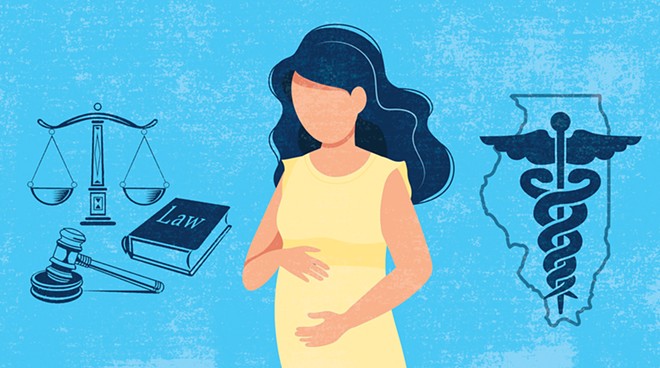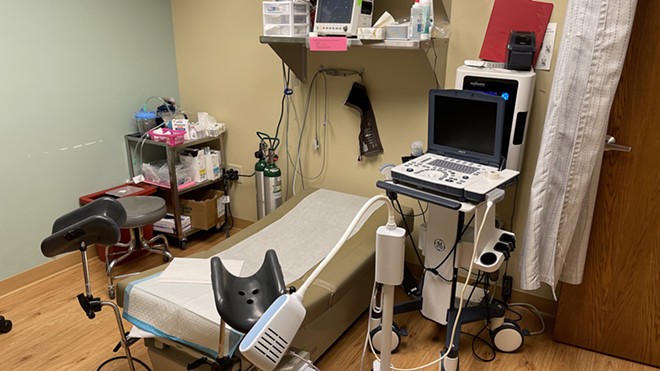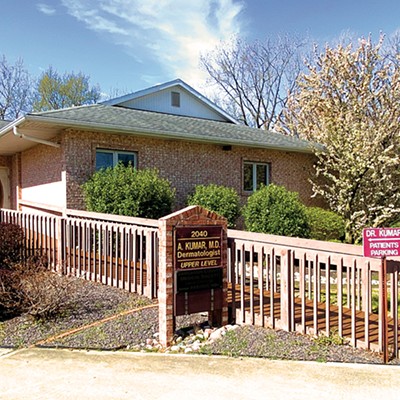The woman was nervous when she arrived in Springfield.
Earlier in the day, she had flown with a companion from her home state of Texas to a Chicago airport, where she rented a car and the two drove to central Illinois.
The woman's goal was to obtain a medical procedure – abortion – that is legal across the United States but is now banned by her home state after a fetal heartbeat can be detected – in about the sixth week of pregnancy.
With logistical and financial assistance from Planned Parenthood of Illinois and other allied pro-choice organizations, the woman got her abortion recently at PPIL's Springfield Health Center. She and her companion then stayed overnight at a hotel in Illinois before flying back to Texas the next day, according to PPIL officials.
"At the end of the day, she was a very scared person who was just trying to get her health care needs met," said Jenna Gordon, a Planned Parenthood licensed clinical social worker who was with the unidentified women that day in Springfield.
Since the Texas law took effect in September, Planned Parenthood's Illinois health centers offering in-clinic and medication abortions, including the center at 601 Bruns Lane in Springfield, have seen a 30% increase in out-of-state residents seeking the service, officials from the nonprofit said.
They wouldn't release specific numbers of abortions performed in Springfield or at other Illinois locations. State officials also wouldn't release the number of abortions by location, saying state law prohibits it.
Among Sangamon County residents, 343 received abortions in 2020. Other abortion totals for residents of large counties include 249 from Macon County, 523 from Peoria County, 372 from McLean County, 162 from Tazewell County, 1,039 from St. Clair County and 22,711 from Cook County.
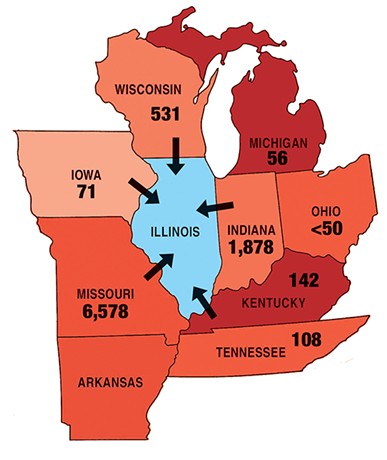
Like the rest of the country, more than 90% of people getting abortions in Illinois are unmarried, and national statistics indicate a majority of abortion patients already have children and are low-income.
More than 87% of abortions in Illinois involve patients ages 20 through 29; minors make up 2.5% of the total, Illinois Department of Public Health statistics indicate.
Black patients receive 38% of the abortions in the United States, a number disproportionate to their share of the population, while white patients receive 33% of abortions.
Abortion rates have been dropping nationwide since the late 1970s. But states surrounding Illinois, and others in the Midwest, have increasingly imposed more restrictions on abortion.
"2021 was the worst year for legislative attacks on abortion since 1973," said Kristen Schultz, chief strategy and operations officer for Planned Parenthood of Illinois.
"Your access to care shouldn't be based on where you live or your financial means or your race or your ability to access information or your ability to get child care," she said. "And we may live in a world where access to care is dependent on those factors."
The number of abortions provided in Illinois to out-of-state residents has more than tripled since 2014, reaching 9,686 in 2020. Out-of-state patients received about one in every five of the total 46,243 abortions in Illinois in 2020, according to the most recent IDPH data.
The number of in-state patients receiving abortions increased about 9% during the 2014-2020 period, while the total number of abortions rose 20%. Out-of-state patients accounted for a majority of the overall increase, IDPH statistics indicate.
Planned Parenthood officials said requests from Texas residents represent only part of the increase in out-of-state abortions at the nonprofit's clinics since September.
The high-profile restriction to abortion in the Lone Star State, which a majority of justices on the U.S. Supreme Court allowed to remain in place, is part of a years-long, nationwide trend of states restricting access to abortion, officials said.
They noted that the Supreme Court became more conservative after the 2016 election of President Donald Trump, a Republican, because Trump was able to appoint justices Neil Gorsuch in 2017, Brett Kavanaugh in 2018 and Amy Coney Barrett in 2020.
With the constitutionality of a Mississippi law banning abortions after 15 weeks of pregnancy now in front of the court, pro-choice advocates say it's possible the court's 6-3 conservative majority will rule this spring or summer to significantly reduce federally protected access to abortion or strike down the court's landmark 1973 Roe v. Wade ruling establishing that right.
Such a scenario, Planned Parenthood officials said, would lead to 26 states quickly banning abortion. The number would include all five states touching Illinois and almost all states in the South, officials said.
As a result, they said Illinois – with few restrictions on abortion and among the fewest in the Midwest – would become even more of a haven for women from other states seeking to terminate their pregnancies.
If Roe falls or is significantly weakened, the current 46,000 abortions conducted each year in Illinois could increase threefold to fivefold, Schultz said.
"It's quite possible" that half of U.S. women of childbearing age – 18 to 49 – could lose access to abortion in their home state, depending on how the Supreme Court rules, she said.
The recent 30% increase in out-of-state patients coming to Illinois Planned Parenthood health centers for abortions is "a small sliver and a small window into the future," Schultz said.
"We have been preparing for this for years, and we have the capacity, and we will do everything in our power to shift operations as the demand requires," she said.
Even if there's increased outreach and assistance to help patients get abortions in states such as Illinois, many women would end up carrying unplanned pregnancies to term or use unsafe options to terminate their pregnancies, Schultz said.
The restrictions other states have imposed include limiting abortions based on gestational age of a pregnancy and imposing mandatory waiting periods that require at least two visits to an abortion clinic before the service can be offered.
Restrictions also include prohibiting telemedicine appointments before medicines can be dispensed that cause a "medication abortion," similar to a miscarriage.
Illinois doesn't make patients deal with any of those restrictions, "so we are most likely going to take care of their needs," Gordon said.
Illinois expands access
Led by Democratic majorities in the state House and Senate, the Illinois General Assembly has been taking action for years to expand access to abortion.
The state allows abortion pills to be sent through the mail to an Illinois address after a telemedicine appointment. Medication abortions overtook surgical abortions, also known as "in-clinic abortions," as the most common form of abortion in Illinois in 2020.
A bill repealing the state's parental notification requirement for minors wanting an abortion was passed by the legislature and signed by Gov. JB Pritzker, a Democrat, in fall 2021 and will take effect June 1.
Illinois' Medicaid program covers abortions for low-income patients living in the state as a result of legislation signed in 2017 by former Gov. Bruce Rauner, a Republican who parted ways with many elected officials in his party on the issue.
The law expanded Medicaid-covered abortions beyond limited cases and also required state employee insurance to cover the procedure.
And in 2019, Pritzker signed legislation that established women's access to abortion as a "fundamental right."
Abortion-rights advocates said they are glad Illinois can provide options for out-of-state patients, while at the same time, lamenting the financial and emotional stress on patients.
Pro-choice groups are making plans to serve even more out-of-state patients – women as well as transgender men and "gender nonconforming" individuals who want abortions, Schultz said.
Chicago-based Planned Parenthood of Illinois – with annual revenues of more than $35 million per year, according to the group's IRS 990 form for fiscal year 2019 – operates reproductive health clinics throughout the state.
Planned Parenthood's preparations to serve more patients from other states included the 2018 opening of a health center offering abortion services in Flossmoor, a south suburb of Chicago near the Indiana border, and the 2020 opening of a similar clinic in Waukegan, near the Wisconsin border, Schultz said.
Preparations also included the formal opening in January of a $10 million Regional Logistics Center in Fairview Heights by Reproductive Health Services of Planned Parenthood of the St. Louis Region in partnership with Hope Clinic for Women in nearby Granite City, Illinois.
The center will expand and improve referral services and make use of a network of private, nonprofit abortion-assistance groups across the country to help patients with the often complicated arrangements of traveling to Illinois' Metro East area for an abortion, according to Bonyen Lee-Gilmore, vice president of strategy and communications for Planned Parenthood of the St. Louis Region.
The Fairview Heights and Granite City clinics both offer abortions, and officials at the Fairview Heights clinic say they have seen a 52% increase in patients traveling to the Metro East area for abortions from out of state compared with a year ago.
The Texas abortion law has had the "ripple effect" of Texas women filling up abortion appointments in nearby states, forcing many women from the states surrounding Texas to travel to Illinois for abortions, Lee-Gilmore said.
The organization's Fairview Heights clinic provides medication abortions for women up to 11 weeks pregnant and in-clinic abortions up to 24 weeks – and, in limited circumstances, 26 weeks.
Since the Texas law went into effect, the clinic has begun to see more out-of-state patients needing abortions later in their pregnancies because of delays in finding an out-of-state appointment and arranging for travel, lodging, time off work, child care and financial assistance, Lee-Gilmore said.
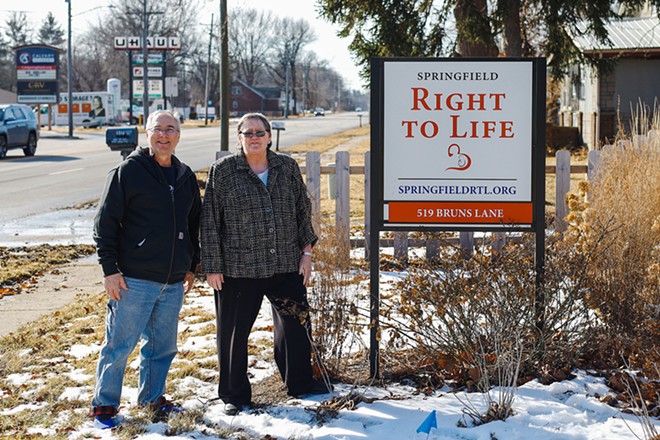
Pro-life groups prepare
Abortion opponents are gearing up for the future, too.
Springfield Right to Life moved its office from downtown Springfield to a site immediately south of the Planned Parenthood clinic on Bruns Lane after the clinic moved from downtown to the west side in 2016.
The organization gathers its supporters on the sidewalk outside the clinic to pray for Planned Parenthood patients and staff on Thursdays, the one day a week when abortions typically are scheduled, group president Tim Moore said.
The Right to Life office is working to expand its support and educational services to pregnant women and adolescents, he said. The office already offers free self-administered pregnancy tests and non-medical sonograms.
Other pro-life groups offering pregnancy support services in Springfield include Pregnancy Care Center of Springfield, Beerlahai Roy Women's Ministries and First Step Women's Center.
While Moore said he is hopeful the Supreme Court will strike down Roe vs. Wade and leave abortion access totally up to the states, he said it saddens him that more out-of-state patients are coming to what he called "the abortion capital of the Midwest. ... the Third World-country of Illinois."
Moore said Illinois is a "pro-life state," but that sentiment isn't reflected in the Democratic-controlled General Assembly or the governor's office.
The pro-choice group Personal PAC says a scientific poll it conducted in 2021 indicated 73% of Illinois voters agreed with the statement, "Abortion should remain legal in Illinois as a private decision between a woman and her doctor, not politicians."
But Amy Gehrke, executive director of Illinois Right to Life, said the Personal PAC poll question was too broad.
"Those who promote absolute abortion access and oppose any law or protection they deem to be a threat to that access are in the minority," she said. "Most Americans support sensible abortion laws that protect the mother and her preborn child."
Gehrke said several nationwide polls show Americans have nuanced views on the topic.
She pointed to a 2021 Gallup poll in which 32% of adults said abortion should be legal under any circumstances, 48% said it should be legal only under certain circumstances and 19% thought it should be illegal in all cases.
She also pointed to a 2022 Marist Poll commissioned by the Knights of Columbus, a Catholic organization, that said 71% of American adults want to either allow abortions only during the first three months of pregnancy or in other circumstances such as rape, incest or to save the life of the mother, or they want to ban abortion entirely.
Moore said demand for abortions from patients inside and outside Illinois in part represents a failure by pro-lifers to meet women's needs for economic stability, education and protection from sexual predators.
"Anyone that's needing an abortion is in a desperate situation that our community has not addressed," he said. "We've got our work cut out for us."
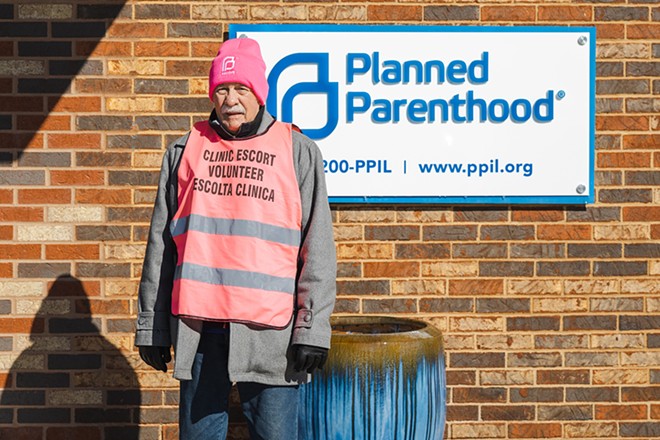
Dealing with uncertainty
Abortion-rights activists aren't shy about voicing concerns that Roe will fall. That's because they said the public needs to be aware of the growing number of abortion restrictions nationwide related to the election of abortion opponents in state legislatures and Congress.
Many patients in states outside Illinois who inquire about abortions think the service already is illegal in their home states, activists said, and pro-choice charities offering financial assistance will need more donations if present trends continue.
The Chicago Abortion Fund, founded in 1985, assisted fewer than 200 people in Illinois and other states with money and logistical support to get abortions in 2018, and the total rose to 3,000 in 2021 – mostly involving patients from the Midwest and some from the South – chief executive officer Megan Jeyifo said.
Before 2019, the nonprofit sometimes didn't have enough money to help everyone who inquired, but that changed when more donors stepped up, she said. The need for support continues to grow, she said.
Patients, on average, face abortion-related medical costs of less than $500, Schultz said. But she and Jeyifo said out-of-state patients often face many additional costs for travel, child care and other expenses when seeking care in Illinois.
The fund's annual budget has more than doubled in the past two years and now stands at about $1 million, she said. The organization recently added 16 more volunteer case managers, bringing the total number of volunteer and paid case managers to 37.
"I'm terrified what happens when Roe falls," Jeyifo said. "We need everyone's money now.
"Navigating travel is so hard; it's so expensive. Whatever it takes, if somebody needs to get to their appointment, we're going to make it happen. Getting an abortion is really, really hard, and it can often feel like you're negotiating this labyrinth."
The fact that Planned Parenthood's Springfield health center isn't close to the border with another state hasn't prevented out-of-state residents from traveling there for an abortion, according to Mara Pliskin, manager of the organization's abortion patient navigation program.
The people who inquire often are looking for the soonest possible appointment, she said.
"So if our Springfield location has availability for appointments, many out-of-state patients will choose that option just to get their care as quickly as possible," Pliskin said.
Patients have driven from their home state to Springfield, or they have flown to airports in Indianapolis or Chicago and driven there, she said. They also have flown into Springfield's Abraham Lincoln Capital Airport, Pliskin said.
Gordon, the Planned Parenthood social worker, added: "Folks are on a time crunch when it comes to abortion care. They are coming to get their needs met and trying to get back to their typical life as soon as possible."
The Springfield health center and other Planned Parenthood of Illinois facilities offer medication abortions up to 11 weeks and six days gestation, and in-clinic abortions up to 22 weeks and six days gestation.
Out-of-state patients have been connected to Illinois abortion providers or allied organizations through referrals and online searches, then traveled to Springfield and Planned Parenthood's other health centers for both in-clinic and medication abortions, Pliskin said.
The recent patient from Texas received an in-clinic procedure. And even though she flew into Chicago, she opted for Springfield because its health center had the soonest available slot, Pliskin said.
"We were able to connect her to an organization that could help her book a flight as well as an organization that could help her book a hotel room," Pliskin said. "We were able to meet all of her needs by leaning on our community partners and using our own internal resources."
Gordon, who provided emotional support in Springfield that day, said the Texas patient was going through a lot of stress.
Without being more specific, Gordon said, "There were multiple life circumstances that were coming up. ... It really spoke to the needs that our patients have when they are traveling such distances in order to get legal care that they should be able to get in their own states."
The woman was beyond six weeks pregnant, so there was no medical facility in Texas that could have provided her abortion.
"It felt like obstacle after obstacle was being placed in her way," Gordon said, "so I think fear was running through her most of the day, and probably from the time she set foot on a plane and then getting back into Texas."
Gordon said it's likely many thoughts were racing through her mind: "Is everything going to go OK? Am I going to be able to afford what's next? Is anyone going to know?"
The Texas law allows people who assist women in getting an abortion to be sued.
"It's a scary process for folks," Gordon said. "There are a lot of unknowns for them, and they're in such a hostile state."
Another recent out-of-state patient drove from Mississippi to Springfield for an abortion and chose Springfield because she could stay with a friend living in the capital city, Pliskin said.
Meeting abortion patients in the parking lot are volunteer escorts wearing reflective pink vests, offering words of welcome and, if patients desire, an umbrella to shield their faces from abortion opponents on the sidewalk along Bruns Lane.
The activists pray, yell and sometimes use loudspeakers to criticize patients and escorts and try to dissuade the women.
"If they're hearing some of the stuff the protesters are saying, it's not pleasant," said one of the Springfield escorts, a 62-year-old retired state worker who asked to be identified only as Patricia P.
Patricia and another escort, Rich O., asked that their last names not be published for security reasons. They walk the patients from their cars to the patient entrance on the south side of the building.
Rich, 75, also a retired state worker, has been an escort for three years. He said some of the protesters are "just really nasty people" who "misquote the Bible."
When asked why he volunteers, he said, "I believe in reproductive choice, and I want people to be able to get the services that they're legally entitled to get and to help support them in their lives and make them feel comfortable with the choices they're making."
The patients and people who accompany them often thank the escorts for putting up with the protesters.
"They say they're sorry that we have to go through what we go through, but it's worth it, for both us as escorts and for patients," Rich said.
Escorts have been wearing masks during the COVID-19 pandemic.
"I'm just trying to provide a little bit of comfort and a smiling face," Patricia said. "We smile with our eyes."
The work of escorts will be even more important in the months to come, Rich said.
"We're going to be providing a lot more abortion services here in Illinois, and I'm sure more of us will be needed," he said.
Rich doesn't know whether the Springfield health center will need to provide abortion services more days each week but said, "We'll be here to help the clients."
Dean Olsen is a senior staff writer with Illinois Times. He can be reached at [email protected] or 217-679-7810.

